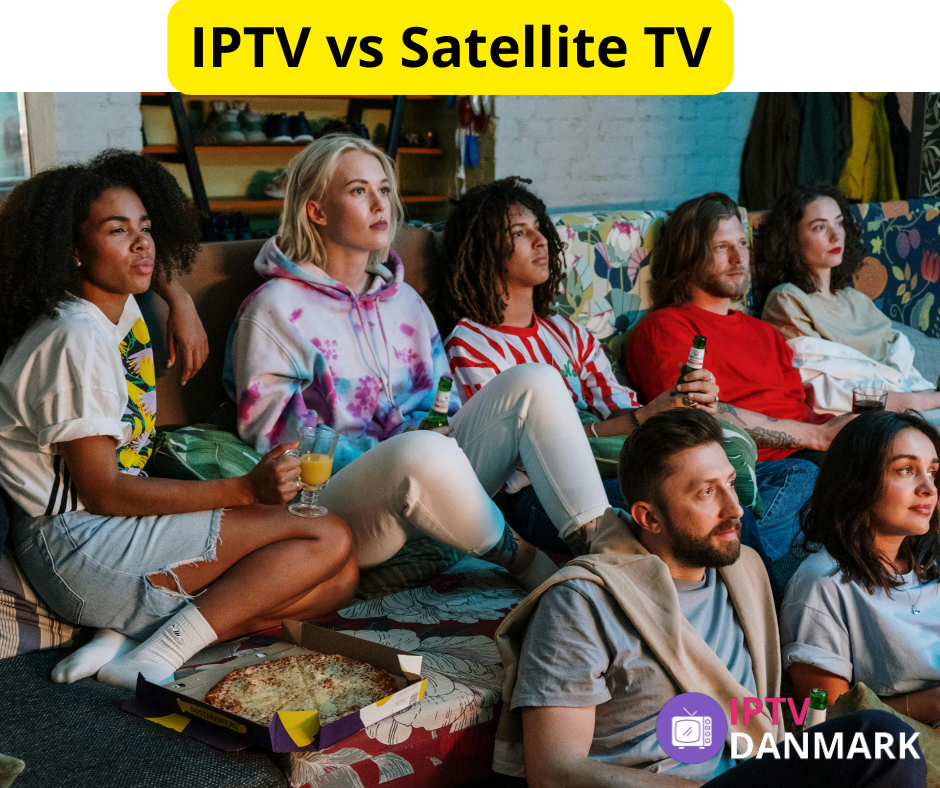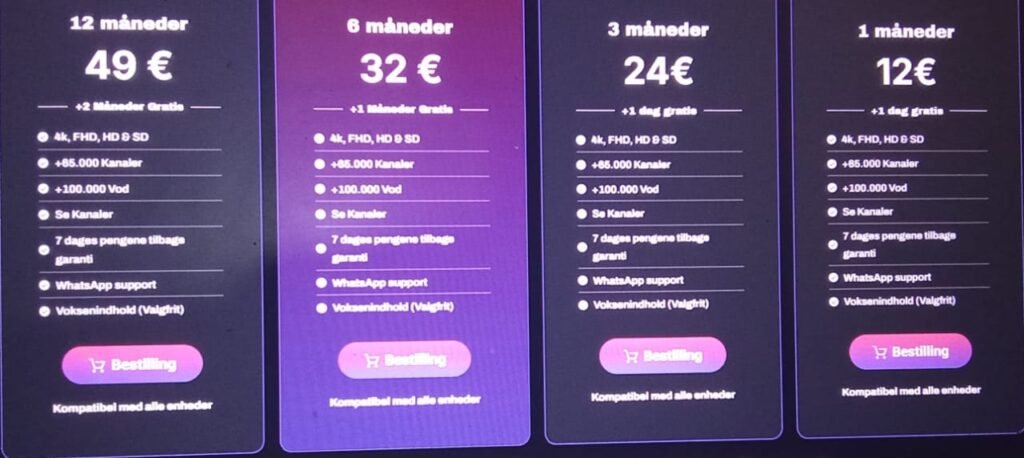IPTV vs Satellite TV In the rapidly evolving world of digital entertainment, choosing the right television service is more important than ever. IPTV (Internet Protocol Television) and Satellite TV are two of the most prominent options available today. While both have their merits, they cater to different user needs and preferences. IPTV delivers television content over the internet, offering flexibility and interactivity, whereas Satellite TV transmits signals via satellites to a dish installed at the viewer’s location.
The viewing experience with IPTV is often more personalized, thanks to on-demand content, multi-device compatibility, and cloud-based recording. Meanwhile, Satellite TV shines in areas with limited internet connectivity, offering stable and extensive coverage. Understanding these differences is crucial for determining which service provides the best overall viewing experience.

Satellite TV or IPTV? A Complete Comparison for Modern Viewers
Modern viewers expect more than just traditional broadcast TV. Features such as high-definition channels, video-on-demand (VOD), mobile viewing, and user-friendly interfaces are in high demand. IPTV answers this call with its internet-based delivery system, allowing users to watch live TV, stream movies, and access a library of content at their convenience.
Satellite TV, however, maintains a strong foothold, especially in rural or remote areas where high-speed internet might be unreliable or unavailable. It provides consistent service with fewer interruptions due to internet issues. A modern viewer must weigh the importance of content accessibility, internet dependency, and additional features when choosing between IPTV and Satellite TV.
The Ultimate Showdown: IPTV vs Satellite TV – Which Should You Choose?
Choosing between Satellite TV ultimately comes down to lifestyle, location, and entertainment preferences. IPTV is ideal for tech-savvy users who desire flexibility, interactivity, and multimedia integration. It allows access to thousands of channels, including international networks, sports, and niche programming, all through a stable internet connection.
Satellite TV remains a solid choice for those who prioritize reliability and traditional programming. It usually requires a set-top box and satellite dish, and while it may lack some of IPTV’s interactivity, it often offers premium channel bundles and a straightforward user experience.
Each platform has its own hardware requirements, subscription models, and channel lineups, so a careful evaluation of personal and household needs is essential.
Cutting the Cord: Is IPTV Really Better Than Satellite TV?
Cord-cutting has become a global trend, with viewers abandoning traditional cable and satellite services in favor of internet-based streaming. v is at the forefront of this revolution, offering an affordable and flexible alternative to conventional TV services. Users can choose from various subscription plans, access content on multiple devices, and enjoy greater control over what they watch and when they watch it.
On the flip side, Satellite TV offers a more traditional viewing experience. It is less susceptible to internet slowdowns and provides consistent quality, especially in regions with poor broadband infrastructure. Therefore, while IPTV is a better option for urban dwellers and tech enthusiasts, Satellite TV still holds value in specific contexts.
IPTV vs Satellite TV: Pros, Cons, and Which Is Right for You
IPTV Pros:
- On-demand content and time-shifting
- Multi-device support (smart TVs, smartphones, tablets, etc.)
- Interactive features such as pause, rewind, and record
- Easier setup and less hardware
IPTV Cons:
- Dependent on a stable, high-speed internet connection
- May suffer from buffering during peak hours
- Potential for service interruptions due to network issues
Satellite TV Pros:
- Broad coverage, even in remote locations
- Reliable signal quality (especially in non-urban areas)
- No internet required
Satellite TV Cons:
- Installation requires satellite dish and receiver
- Limited interactivity and customization
- Weather can affect signal quality
Evaluating these pros and cons based on your individual circumstances will guide you to the right decision.

Streaming vs Satellite: Why IPTV Might Be the Future of Home Entertainment
The surge in demand for streaming content has positioned IPTV as a key player in the future of home entertainment. With the rise of smart homes and digital lifestyles, IPTV services align perfectly with consumer expectations. Features like voice search, AI-based recommendations, and integration with home automation systems make IPTV not only more appealing but also more intuitive.
Satellite TV, while still relevant, may struggle to keep up with these technological advancements. Its traditional delivery method and limited interactive features make it less adaptable to the modern, connected home.
The future clearly leans towards internet-based solutions, and IPTV is leading the charge.
Technology Face-Off: IPTV or Satellite TV – Which Reigns Supreme in 2024?
In 2024, both IPTV and Satellite TV have evolved to meet the demands of a digitally connected audience. However, IPTV has surged ahead in innovation. Services now offer Ultra HD streaming, personalized content libraries, and seamless cross-platform integration.
Satellite TV providers have made strides by adding DVR capabilities, HD channels, and app-based viewing options, but they still lag behind in terms of interactivity and personalization.
From a technological standpoint, IPTV offers a more advanced and future-ready solution. It allows for rapid updates, user analytics, and integration with smart ecosystems – features that traditional satellite systems struggle to match.
Picture Quality, Cost, and Channels: IPTV vs Satellite TV Compared
Picture Quality: IPTV supports HD and 4K streaming, provided the internet connection is strong. Satellite TV also delivers high-definition content, but it can be affected by weather conditions.
Cost: IPTV often provides more flexible pricing plans, including monthly, quarterly, or yearly subscriptions. Satellite TV usually requires long-term contracts and higher initial installation costs.

Channel Variety: IPTV excels in offering international channels and niche content, while Satellite TV focuses on regional and popular channels. IPTV often includes VOD libraries, which are limited or absent in Satellite services.
The better option depends on what you value more: cost-effectiveness, content variety, or reliability.
Is It Time to Switch? Evaluating IPTV as a Replacement for Satellite TV
If you currently use Satellite TV, switching to IPTV could bring numerous benefits. The ability to stream on-demand, watch TV across devices, and control content makes IPTV an attractive upgrade. The decision, however, hinges on internet quality. Without a strong connection, IPTV may fall short.
For those in areas with robust broadband, the switch is a logical step. You gain modern features, better user interfaces, and more viewing freedom. However, if you live in a rural area with limited connectivity, sticking with Satellite TV might still be the best option.
IPTV vs Satellite TV: Everything You Need to Know Before You Subscribe
Before subscribing to either service, consider the following factors:
- Location: Is your area well-served by high-speed internet?
- Budget: Can you afford the installation and ongoing costs?
- Viewing Habits: Do you prefer live channels, or are you more into streaming and on-demand?
- Device Compatibility: Do you want to watch on multiple devices or just one TV?
Answering these questions will help you choose a service that matches your entertainment needs. Both IPTV and Satellite TV have their unique advantages, but understanding your own preferences is key to making the best decision. IPTV vs Satellite TV IPTV vs Satellite TV IPTV vs Satellite TV IPTV vs Satellite TV IPTV vs Satellite TV IPTV vs Satellite TV IPTV vs Satellite TV IPTV vs Satellite TV
Conclusion
The battle between IPTV and Satellite TV continues, with each offering distinct advantages. IPTV is rapidly gaining ground with its flexible, user-friendly, and modern features, making it ideal for digital-savvy users. Satellite TV, while more traditional, remains a reliable option in areas lacking strong internet infrastructure.
Ultimately, the best choice depends on your lifestyle, budget, and connectivity. By carefully weighing the benefits and limitations of each, you can find the perfect solution for your home entertainment needs.
